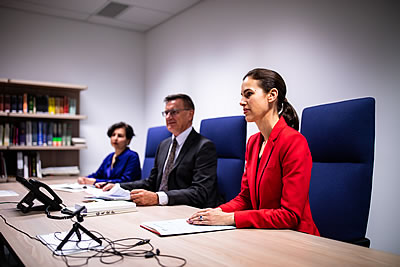On this page:
Each application is different and we will work with you to find the best way to resolve your application. Options for resolving applications include – online dispute resolution, outreach, conference or a VRB hearing.

Online Dispute Resolution
The mission of the VRB is to deliver justice by listening to veterans and making high quality decisions in a timely, cost effective and efficient way.
The VRB will soon be trialling online dispute resolution (ODR) to increase veterans’ access to justice by providing a modern, simple, efficient, user-friendly and accessible forum for veterans, current serving members and their families seeking review of decisions that affect their interests.
ODR lets current serving members, veterans and their families resolve applications when and where it’s convenient for them. This could be at home, at work or on a phone.
You can read more about online dispute resolution here.
Outreach
Outreach is about helping you to resolve your application.
Our VRB Conference Registrars and Member are dispute resolution experts who will guide you through process. They are also independent.
At an outreach, you can talk to an independent VRB Conference Registrar or Member about the decision you have received from DVA. We will contact you to set up a time for this discussion. It can take place by phone, video or face-to-face.
The VRB Conference Registrar or Member will explain then review process and ask you to tell us why you are unhappy with the decision. They will also help you to identify the issues in your case and discuss the next best steps to resolve it.
Outreaches are private, confidential sessions and the VRB Conference Registrar or Member will not disclose anything you have said without your consent.
In some cases, the VRB Conference Registrar or Member may recommend that your case can be resolved by a favourable decision ‘on the papers’.
If the case can be resolved in this way, you will be sent a copy of a draft decision. If you accept the draft the VRB will make a final decision, a copy of which will sent to you and DVA.
Communication is the key
When it comes to preparing for your outreach, these tips may help.
- Express your views clearly and listen carefully to what the VRB Conference Registrar or Member is saying.
- Have an idea of what you want to achieve, and what you may be willing to compromise;
At the end of the outreach, the VRB Conference Registrar or Member will tell you what the next step is.

Hearings
We encourage all veterans to participate in their hearings. Attending a hearing may seem daunting, but our hearings are much less formal than a traditional legal hearing. Our hearings are held in private and they are not open to the public. A representative from DVA will generally not attend VRB hearings. You are welcome to bring a friend or support person to your hearing, regardless of whether you are represented.
If you cannot attend in person, we can arrange for you to participate in the hearing by phone or video. VRB hearings are recorded.
Our members will do their best to make you feel at ease. One of the members hearing your case will meet you in the reception area of our registry and invite you into the hearing room.
Our hearings generally take less than one hour.
Your case will usually be heard by three members:
- a Senior Member
- a Member
- a Services Member.
Members of the VRB are independent and are not public servants employed by the Department of Veterans’ Affairs. All of our Services Members (and some of our other members) have military experience.
Telling us about your case
The members hearing your case will ask you to explain why you are unhappy with the DVA decision being reviewed. The members may ask you questions.
Generally witnesses do not appear in person at VRB hearings. If you have a witness, the VRB may ask to speak to them by phone.

Decisions on the day of your hearing
The members will listen to you, and any witness that takes part in the hearing. They will then analyse all the evidence presented and make a decision based on the law that applies to your situation.
Where possible, the members will make their decision on the day of your hearing and tell you the reasons for their decision. You will also receive a written copy of the decision and the DVA will also be sent a copy.
If a decision cannot be made on the day of the hearing, we will send you a copy of the VRB decision and reasons at a later date. DVA will also receive a copy of the decision and reasons.
VRB decisions and reasons are not published or made public. They are only provided to you and DVA.
